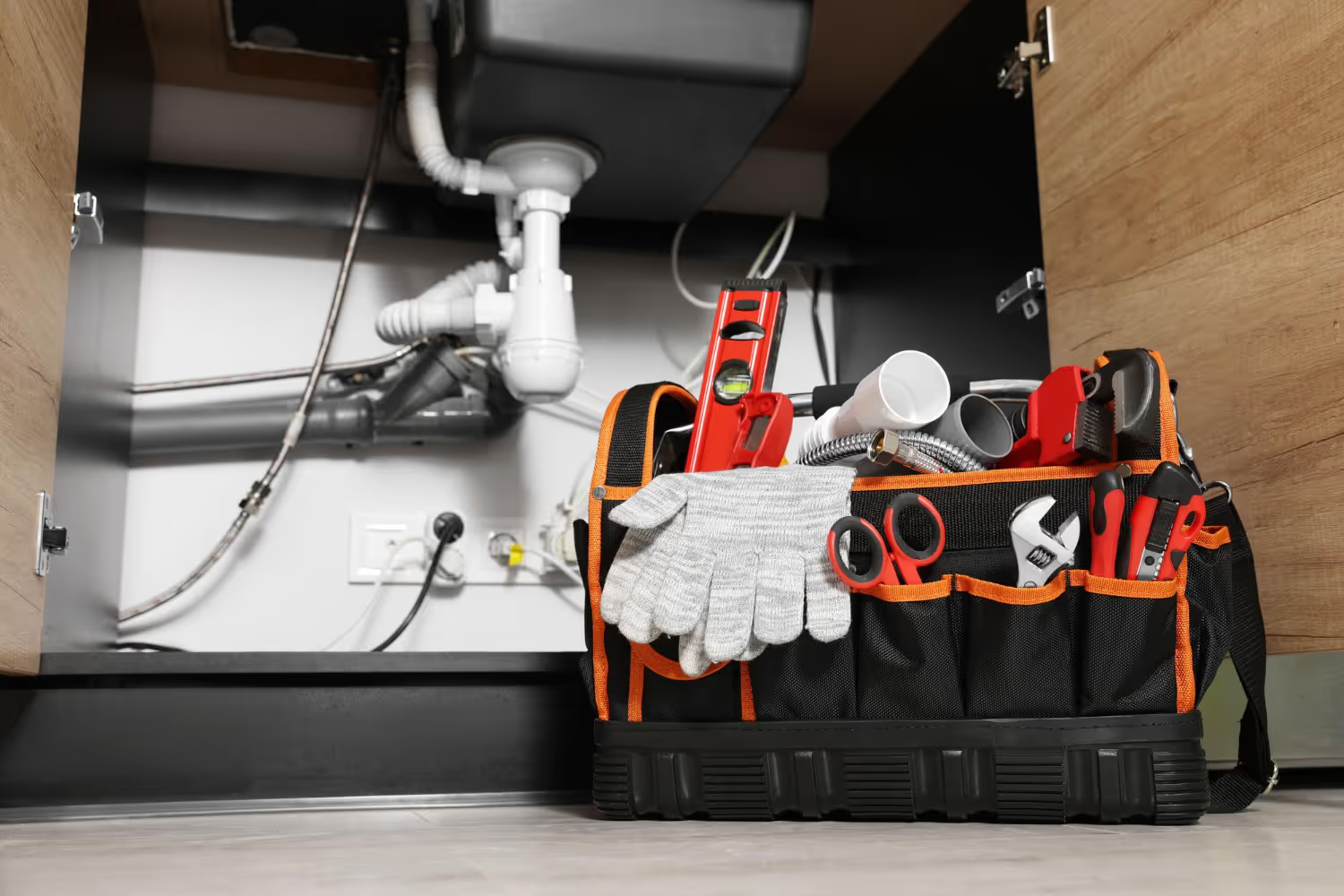


FREE Water Heater
With every whole house repipe purchase. Free brand-new water heater or credit towards a tankless water heater.
.svg)
.svg)
.svg)
.svg)



With every whole house repipe purchase. Free brand-new water heater or credit towards a tankless water heater.
.svg)
.svg)
.svg)
.svg)

Florida's unique climate and geography create specific plumbing challenges that homeowners across the state face daily. From the humid coastal areas to the sandy soils and frequent storms, our state's environment puts extra stress on plumbing systems that many other regions don't experience.
The EPA reports that Florida has the highest number of lead service lines delivering water to homes, increasing the urgency for homeowners to ensure their fixtures and mains meet modern lead-free standards.
Understanding how Florida's weather patterns, soil conditions, and building codes affect your home's plumbing can save you thousands of dollars in repairs and prevent major water damage. Many common issues like pipe corrosion, root intrusion, and pressure problems stem directly from our state's distinctive conditions.
We'll explore the most frequent plumbing problems Florida homeowners encounter, how our weather impacts your pipes and fixtures, and the essential code requirements you need to know. You'll also discover practical prevention strategies that work specifically for Florida homes, helping you maintain a reliable plumbing system year-round.
Here’s what you need to know:
By the end, you'll know how Florida’s unique climate, soil, and weather create common plumbing problems and discover expert tips to prevent costly repairs in your home.
Florida's hot climate and hard water create unique challenges for home plumbing systems. Humidity, mineral buildup, and year-round heat cause faster wear on pipes and fixtures than in other states.
Analysis from the University of Florida shows that when calcium concentration exceeds 180 ppm (10.5 grains per gallon), water is classified as “very hard.” Much of Florida’s groundwater meets this threshold, leading to mineral buildup that narrows pipes, reduces flow, and accelerates fixture wear.
Hard water damage tops our list of Florida plumbing problems. The state's water contains high levels of calcium and magnesium that build up inside pipes over time.
This mineral scaling reduces water flow and damages pipe walls. We see this problem in nearly every Florida home we visit.
Pipe corrosion happens faster in Florida's humid air. Metal pipes rust and deteriorate more quickly than in dry climates.
Galvanized steel pipes are especially vulnerable to this problem. The constant moisture in the air speeds up the rusting process.
Clogged drains occur more often due to Florida's sandy soil and frequent storms. Sand and debris wash into sewer lines during heavy rains.
Leaky fixtures fail sooner because of mineral deposits from hard water. Faucets, showerheads, and toilet parts wear out faster than normal.
Root intrusion into sewer lines is common because of Florida's year-round growing season. Tree roots seek out water sources and can crack underground pipes.
Low water pressure throughout your home signals mineral buildup in pipes. This problem gets worse over time if we don't address it.
Discolored water coming from taps indicates pipe corrosion. Brown or orange water means rust is breaking loose inside your pipes.
Slow drains in multiple fixtures point to main line problems. This often means tree roots or major clogs in your sewer system.
Water stains on walls or ceilings show hidden leaks behind walls. We find these leaks cause expensive damage if left unfixed.
High water bills without increased usage suggest leaks somewhere in your system. Even small leaks waste thousands of gallons per year.
Strange sounds like gurgling or whistling from pipes indicate air in the lines or partial blockages.
Galvanized pipes over 20 years old need replacement in Florida's climate. The humid air and hard water cause these pipes to fail faster than in other states.
We recommend replacing galvanized pipes with modern materials like copper or PEX. The upfront cost saves money on future repairs and water damage.
PEX pipes generally last longer and resist Florida's hard water better than metal pipes. They don't corrode or develop mineral buildup like galvanized steel.
However, older PEX installations may have connection problems. We inspect the fittings and joints to determine if repairs or replacement work better.
Copper pipes resist corrosion well but can develop pinhole leaks from Florida's acidic water in some areas.
The decision depends on your pipes' age, condition, and repair history. We evaluate each situation to recommend the most cost-effective solution.
Florida's extreme weather creates unique challenges for plumbing systems throughout the state. High temperatures, intense humidity, and severe storms can damage pipes and create costly repairs.
Florida's year-round heat and humidity put constant stress on plumbing systems. The high temperatures cause pipes to expand and contract repeatedly.
This expansion can loosen pipe joints over time. Metal pipes are especially vulnerable to this thermal stress.
Heat-related plumbing problems include:
Humidity creates additional challenges for exposed pipes. Moisture in the air can cause condensation on cold water pipes.
This condensation can lead to water damage in walls and ceilings. It also creates conditions for mold growth around pipe areas.
Underground pipes face different heat challenges. Hot soil temperatures can stress buried water lines and sewer pipes.
Florida's storm season brings heavy rainfall that can overwhelm plumbing systems. Sudden downpours stress drains, pipes, and sump pumps.
Common storm-related issues:
Heavy rains can saturate the ground around your home. This puts pressure on underground pipes and can cause them to shift or crack.
Florida's flat landscape makes drainage problems worse. Water has fewer places to go during heavy storms.
Hurricanes and tropical storms create the most severe plumbing challenges. High winds can damage exposed pipes and plumbing vents on roofs.
Storm surge can push saltwater into sewer systems. This causes backups and contamination in homes near the coast.
Regular maintenance helps protect your plumbing from Florida's harsh weather. We recommend inspecting your system before storm season begins.
Essential maintenance tasks:
Install proper drainage around your home's foundation. Good drainage prevents water from pooling near underground pipes.
Consider upgrading older plumbing materials that handle heat poorly. PEX pipes resist thermal expansion better than older PVC systems.
Keep trees trimmed away from sewer lines. Root intrusion becomes worse during Florida's wet season when roots seek water sources.
Schedule professional inspections after major storms. Hidden damage can cause expensive problems if left untreated.
Florida plumbing codes set specific standards for installation, design, and maintenance of home plumbing systems. Licensed plumbers must follow these regulations, and homeowners benefit from understanding basic requirements when planning projects or selecting contractors.
The Florida Building Code Plumbing follows the International Plumbing Code with state-specific changes. The current 8th Edition from 2023 governs all plumbing work across Florida.
Water conservation is a major focus in Florida codes. Low-flow fixtures are required in most new installations. Toilets must use no more than 1.6 gallons per flush.
Flood resistance requirements are strict due to Florida's climate. Plumbing systems in flood zones need special materials and installation methods. Backflow prevention devices are mandatory in many areas.
Pipe materials have specific approval standards. Copper, PVC, and CPVC are commonly approved materials. Lead pipes are prohibited in all new construction and major renovations.
Septic systems follow detailed state regulations. Tank size depends on home size and bedroom count. Drain field requirements vary by soil type and local conditions.
Hot water systems must meet energy efficiency standards. Tank insulation and pipe insulation requirements help reduce energy costs. Solar water heating gets special consideration in many Florida counties.
Yes, Florida requires all plumbers to hold valid state licenses. We have three main license types for different work levels.
Journeyman plumbers license can perform most residential plumbing work. All plumbers must complete four years of training and pass state exams. Journeymen work under master plumber supervision for permits.
Plumbing contractors hold business licenses for plumbing companies. They must carry liability insurance and workers compensation coverage. Contractor licenses require financial responsibility proof.
Insurance requirements include general liability coverage. Most contractors carry at least $1 million in coverage. Workers compensation protects employees during job site accidents.
License verification is easy through the Florida Department of Business and Professional Regulation website. We recommend checking every plumber's license status before hiring.
Start by verifying the plumber's license through the state database. Check for any complaints or disciplinary actions on their record.
Get multiple quotes from different licensed plumbers. Compare prices, timelines, and warranty terms. Quality plumbers provide detailed written estimates.
Ask about permits for your specific project. Licensed plumbers know which jobs require permits and handle the application process. Permit costs should be clearly explained upfront.
Review insurance certificates before work begins. Liability insurance protects your property during the job. Workers compensation covers any employee injuries.
Check local references from recent customers in your area. Good plumbers maintain strong community reputations. Online reviews help identify consistent service quality.
Understand warranty terms for both labor and materials. Reputable plumbers stand behind their work with clear warranty policies. Get warranty details in writing before starting work.
Confirm code compliance knowledge for your specific project type. Experienced Florida plumbers know local code variations and inspection requirements.
Florida's unique climate creates specific challenges for home plumbing systems, from hard water buildup to storm damage. Regular maintenance and knowing when to call professionals can save thousands in emergency repairs.
We recommend scheduling annual plumbing inspections before hurricane season starts. This timing helps catch problems before severe weather hits your area.
Check your water heater monthly for sediment buildup. Florida's hard water causes minerals to collect at the bottom of tanks. Flush the tank every six months to remove this buildup.
Monthly tasks we suggest:
Inspect your main water line where it enters your home. Look for wet spots in your yard that might signal underground leaks.
Clean your drains regularly using baking soda and vinegar. Avoid chemical drain cleaners that can damage Florida's older pipe systems.
Check toilet flappers and fill valves twice a year. The humid climate can cause rubber parts to break down faster than in other states.
Call a plumber immediately if you notice sudden drops in water pressure throughout your home. This often signals a main line break or serious blockage.
Emergency situations requiring professional help:
Contact professionals when you see rust-colored water from multiple faucets. This indicates pipe corrosion that needs expert assessment.
Schedule professional drain cleaning if multiple drains back up at once. Tree roots commonly invade Florida sewer lines during rainy seasons.
We suggest calling plumbers for water heater issues beyond basic maintenance. Florida's hard water can cause complex internal damage that needs professional repair.
Get professional help for any plumbing work that requires permits. Most Florida cities require permits for major pipe replacements or new fixture installations.
Florida plumbers typically charge $75-$150 per hour for standard service calls. Emergency calls after hours or weekends cost $150-$300 per hour.
Service Type
Average Cost Range
Drain cleaning
$100-$250
Toilet repair
$150-$300
Water heater repair
$200-$500
Pipe replacement
$300-$800
Most plumbers charge a trip fee of $50-$100 that gets applied to your final bill. This covers their travel time and basic diagnostic work.
Complex jobs like main line repairs cost $1,000-$4,000 depending on access and length of pipe. Hurricane damage repairs often fall into this higher range.
We've found that getting quotes from three licensed plumbers helps ensure fair pricing. Make sure any estimate includes parts, labor, and permit fees.
Some plumbers offer maintenance plans for $100-$200 annually. These plans typically include one inspection and discounts on future repairs.
Florida's unique climate and water conditions create specific plumbing challenges that homeowners must address. We've covered the essential aspects of maintaining and upgrading plumbing systems in the Sunshine State.
Regular maintenance prevents costly emergencies. Annual inspections help catch problems before they become major issues. This proactive approach saves money and protects your home's value.
Cost planning matters. Residential plumbing installations typically range from $8 to $16 per square foot in Florida. Understanding these costs helps you make informed decisions about repairs and upgrades.
We recommend working with licensed local plumbers who understand Florida's specific requirements. They know the building codes and climate challenges that affect your plumbing system.
Prevention is always better than reaction. Simple maintenance tasks and professional inspections protect your home's plumbing system. This approach ensures reliable water supply and proper waste disposal for years to come.
Your plumbing system is a critical investment in your Florida home. Taking care of it properly protects both your property and your family's health and comfort.
Book your plumbing inspection or repair with Sunshine Service to keep your Florida home protected from unexpected water damage and costly issues.